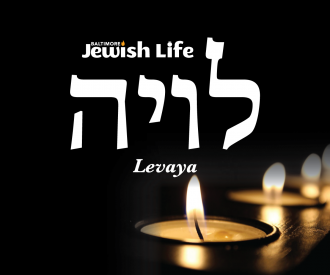We are now within a seven week period of the Jewish calendar which is referred to as the shiva d’nechemta – the seven (weeks) of consolation. How is this; i.e. where does this term originate?
These seven weeks follow on the heels of ‘Three Weeks’ of mourning over the destruction of the two Temples. During these Three Weeks – beginning with the fast of the seventeenth of Tamuz and ending with fast of the ninth of Av – we read as haftaros (following the regular Torah reading on Sabbath day) selections from our prophets which foretell of the oncoming Destruction of Jerusalem, of the Temple, and the dispersion of the Jewish people from their Land. The Shabbos immediately preceding Tisha b’Av is known as Shabbos Chazon based upon the dire prophecy of Isaiah [1:1-27; “The vision (chazon) of Isaiah, son of Amoz, which he saw concerning Judah and Jerusalem…”] which is read as the haftarah for parshas Devarim.
After these Three Weeks of sadness, semi-mourning and outright mourning on Tisha b’Av, the first Shabbos after Tisha b’Av is a Sabbath of rejoicing over the hope for comfort and consolation. R’ Eliyahu Kitov zt”l in The Book of Our Heritage writes, “It is called, Shabbos Nachamu after the prophetic portion read in the haftarah, “Nachamu, nachamu ami, yomar Elo-keichem … Comfort, comfort My people, says your G-d. Speak to the heart of Jerusalem and proclaim to her that her time of exile has been fulfilled…” [Isaiah 40:1-26]. The haftarah of Shabbos Nachamu is the first of the shiva d’nechemta – the seven haftaros of consolation: Seven prophetic passages of comfort which are read from the Book of Isaiah on the seven Sabbaths which follow Tisha b’Av. One-hundred and forty-four verses are contained in all the seven haftaros of consolation – corresponding to the one-hundred and forty-three verses of admonition which are contained in all the verses of tochacha (rebuke) written in the Torah. But, the verses of consolation exceed those of admonition by one verse [to tip the scales, so to speak].”
It seems clear from this initial look at our mesorah that the word nechama has as its most immediate and uncomplicated meaning the concept of comfort and consolation. After experiencing suffering, pain and disappointment, the human soul craves to be consoled and comforted – to find in the universal experience of loss and despair an element of hope and optimism, faith and courage; to discover the ray of light after the storm; that inspiration which gives true meaning to our lives. It is the contrast of hope against the backdrop of pain that brings the virtue of nechama into such sharp relief. This is not just a nice idea; rather, it is a core mitzvah to be menachem aveil – to comfort the bereaved and to stay by their side in their moment of grief. “It is better to go to the house of mourning than to go to the house of feasting” [Ecclesiastes 7:2] because to share in another’s pain and offer actual (vs. virtual) consolation in the form your bodily presence will teach you more about the meaning of life than happiness and rejoicing … even when the latter is also l’dvar mitzvah.
However, you may recall that there is a more subtle alternate meaning to the word nechama, and, when viewed through the prism of Torah exegesis, may even vie with ‘comfort’ and ‘consolation’ for primary position. At the very end of parshas Bereishis, we are told that the Creation experiment is going poorly, the best-case scenario of Man living in harmonious union with his fellow man and with G-d broken apart and dashed upon the sharp rocky landscape of free-choice and self-interest [Genesis 6:5-8]:
“G-d saw that the wickedness of Man was great upon the earth, and that every product of the thoughts of his heart was but evil always. And G-d reconsidered (v’yee’na’chem) having made man on earth, and He was pained in His heart. And G-d said, I will wipe out man whom I created from upon the face the earth – from man to animal, to creeping things, and to birds of the sky; for I have reconsidered (nee’cham’tee) My having made them. But Noah found grace in the eyes of G-d.”
The English translations here do not say that G-d was ‘comforted’ or ‘consoled’ that He made Man (although the Hebrew root of the words under consideration, nun•ches•mem, is the same as that in our key word, nechama). No, saying that G-d was comforted or consoled by this unhappy turn of events would certainly not be fitting. Although the great Biblical commentator, Rashi zt”l, does mention in his commentary that the root verb used here does mean to be consoled, he nevertheless emphasizes G-d’s reconsideration of His actions:
“Va’yee’na’chem – The attitude of the Omnipresent was transformed from the attribute of Mercy to the attribute of Judgment [Bereishi Rabbah 33:3]. The question arose in His thought before him regarding what to do with man, who He had made on earth. Similarly, all instances of words from the root nun•ches•mem mean ‘reconsidering what to do’.”
So, let us deconstruct this scenario and compare it to our three weeks of mourning and tragedy, followed by the shiva d’nechemta – the seven weeks of … (should we say?) consolation:
In the Book of Genesis, we are told that G-d was “pained in His heart”: Whereas the Creation scenario that G-d had envisioned was one of harmony and peace, the actual turn of events produced a situation “where the wickedness of Man was great upon the earth, and that every product of the thoughts of his heart was but evil always.” This pain, despair and profound disappointment brings G-d to have feelings of nechama – to ‘reconsider’ what He has done and to make alternate plans accordingly.
Can we not draw a direct parallel to the tragedy that has befallen us with the loss of the Temple and our Homeland? Whereas the original scenario that both G-d and we, His people, had envisioned with the building of the Bais Hamikdash and our dwelling in the Land was one of beauty and lasting grandeur– this beautiful and idyllic situation instead turned to tragedy and despair. Instead of showing honesty, decency and kindness one to another in the midst of unparalleled opportunity, we turned away from the Torah and towards our baser actions of deceit, thievery and sinas chinam (baseless hatred).
Of course, we need to feel consoled and comforted in the face of such a great loss, hoping that we will be granted another chance to prove ourselves worthy of such Divine gifts. But, our nechama must also include a ‘reconsideration’ of those actions which led to such a painful and tragic situation – and decide what courses of action can help us make amends and restore what has been lost. Seven weeks of reconsideration and restorative thinking will certainly help to do the trick and help transform sadness into true rejoicing.
*******************************************
We learn a key mishnah in Pirkei Avos that the world stands upon three things: Torah study, Service (to G-d) and on Kind Deeds [Avos 1:2]. Perhaps we can use this as a platform for rethinking our actions; b’aniyus da’ati, perhaps we can ‘reconsider’ the following, deciding to realign our thoughts and actions in small ways:
Torah: Maybe it’s possible to add five minutes of Torah study to our schedules each day. There are so many opportunities for doing this: the five minutes while waiting for davening to begin, the five minutes after davening ends; the five minutes waiting for the doctor to see us, the five minutes before or after dinner; five minutes subtracted from internet reading, five minutes at night learning Mishnah Berurah (perhaps via a telephone chavrusah). We have just finished watching videos on Tisha b’Av on the great merit of kiruv, of reaching out to those who don’t know about Torah. On a more ambitious note, perhaps we can set up chavrusah learning Torah with someone who unaware of our precious gift and heritage. Call Partners in Torah and they’ll set you up. Or simply turn to that acquaintance who doesn’t know much Torah and ask, “How would you like to learn Torah together?” Your own reward will be greater than your chavrusah’s.
Avodah: Maybe it’s possible to daven at least one Shmoneh Esrei during the week milah b’milah – word for word without rushing and without thinking about something else. How about on Shabbos kodesh, when there’s no rush – right ;-)? Maybe SE is too long for such concentration – how about one Psalm in pesukei d’zimra said with kavanah and concentration? The prayer landscape is filled with such beauty; it’s a shame to always be on the express train. Also, maybe it’s possible to take five minutes extra each day and say Tehillim (Psalms). Many of us could finish the entire Book of Psalms once a month with just a five minutes input each day. Too much trouble? Then how about one or two extras Psalms each day. David Hamelech wrote each psalm reaching out to the Jewish soul; are we listening? And maybe, after davening each day, we can take a few minutes to talk straight to Hashem, in our own words, expressing our thanks for His kindnesses to us, asking Him directly for our heartfelt desires, telling Him we’re sorry that we sometimes miss the mark.
Gemillus Chasadim: Perhaps it’s possible to pick up the phone every day and call that person you’ve been thinking about, and wondering how they’re doing? We can also take just a few moments to reach out to our parents, gransparnents, children & grandchildren and ask them how things are going and that we’re thinking about them. Perhaps we can just ignore the perceived slights and insults that others may (or may not) have directed towards us. Of course it’s hard to do (why else would we pray for Divine assistance in this area at least three times a day, seven days a week, fifty-two weeks a year – in our ‘meditation’ at the close of every SE!) – but someone who can do this is very, very close to Hashem and deserves His special attention. G-d showers love and kindness upon all of humanity constantly, even though so many are disrespectful of Him, or dismiss His existence altogether! [Think about G-d’s ‘Gevuros’ in the second bracha of SE; Ay’ze’hu gibbur? Hakoveish es yitzro! G-d’s ‘Power’ is His ability to perform acts of kindness no matter what].














